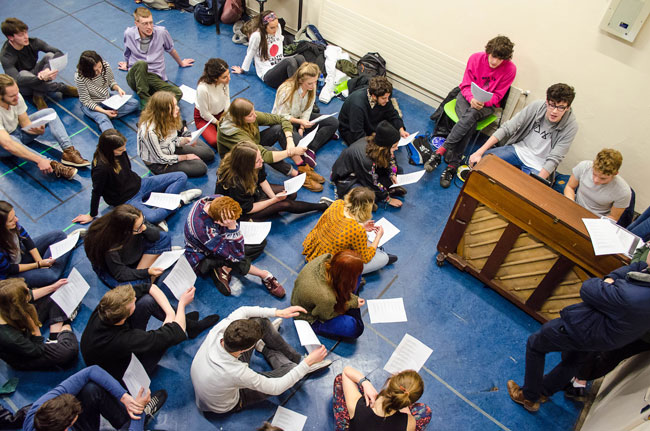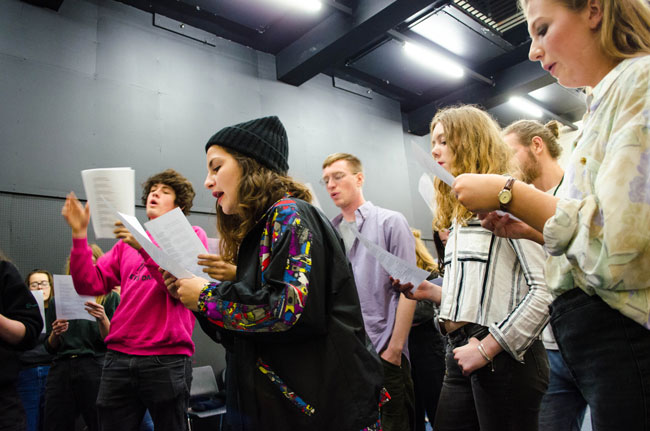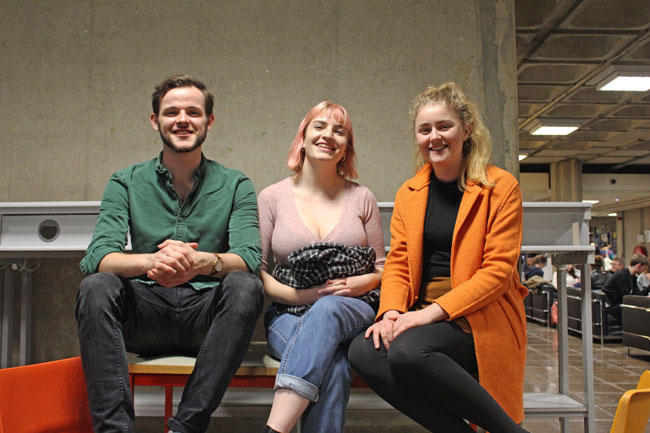
Walking into the DU Players rehearsal studio and being greeted by a circle of 50 eager, excitable students exclaiming nonsense phrases while warming up for their evening ahead, you might think you’ve stumbled across some kind of cult, a group of library goers who’ve cracked or maybe a combination of the two. In fact, this is co-op: a large-scale play put on in week six of Michaelmas term aimed at introducing people to the drama society. For many outside the sphere of DU Players, and even for some who are members of the society, the extent of their perception of the group may be limited to the above.
For the many actors involved in this mammoth production, the foundation of their six weeks of preparation is improvisation. Before that, however, the directors need to establish a high benchmark of energy, keeping everyone alert through exercises that have passed from co-op to co-op, something that I myself noticed from my time spent in the production two years ago. This creates a grounding sense of long-standing tradition for someone revisiting this DU Players staple. The warm-ups become crucial when you think about the challenge faced by four directors in maintaining the attention span of such a large group.
Even three weeks in, a surprisingly fun name game simply entitled Bang is still a key part of the process. Everyone is reminded of the rules of this simple yet effective method of engagement before participants are eliminated one by one, giving a sense of high stakes to an otherwise tedious activity. This competitive edge makes all involved, subconsciously or otherwise, want to learn the names of their peers. The fun, playfully tense atmosphere provides the perfect opportunity for cast bonding over otherwise awkward activities. It may seem absurd, but in these circumstances one might feel more self-conscious if they chose to not engage with the downright ridiculous.
Once the energy is raised and maintained, the complicit improvisers are assigned their tasks. Although there is a sense of passing practices from one year to the next, the directors make use of the space for adapting new techniques for this new generation of co-op, creating a new addition to the morphing, changing canon: Party Quirks. Here, the group have to perform either as an historical figure, celebrity or specific process while one member (the host of this eccentric party) has to guess who they are or what they’re doing. The directors utilise the remaining cast in asking for suggestions facilitating an inclusive and collaborative process.
With this in mind, the possibilities for improvisation are opened and accepted as appropriate for the zany situations. The activity I saw during my observation of this generation saw Napoleon being labelled as “that guy that did all that shit in France”, to Paris Hilton quotably saying “I’m rich, shut up” and one cast member physically getting into a bin holder to show the process of turning into rubbish. In presenting this exercise as a game it encourages people to go to extreme lengths to have their identity revealed and equally to get their jokes in for themselves – a no-limits space in the best possible way.
Part of the onus is on the cast as well as. Cast member Jonathan Staine, a first-year sociology and social policy student, tells The University Times that, for him, it’s key to “leave your inhibitions outside when you come to rehearsal” and that “it needs to be weird to work”. When the group are actively engaged, the more the opportunity for them to see their peers acting out these ridiculous fantasies arises. It is this cohesive energy that establishes a foundation for quick thinking even as they move to a stricter focus on script.
With every game of Party Quirks, energy levels increase and, as a result, running jokes are seen to be thrown in for the duration of the rehearsal, along with interjections from the cast at suitable moments, such as when one member pretended to turn on some music for the farcical party and the rest of the room kindly provided her with background music to work with. The group were especially celebratory when the host managed to reveal a particularly tricky guest’s identity, enhancing the communal vibe. It is moments like these that make many of the visiting students present agree that having a group of people to interact with on a daily basis with a common goal really helps you to settle in to a foreign place and to open up during a potentially stressful and vulnerable time.

It is perhaps this close-knit bonding that unintentionally alienates other people from knowing what co-op is like. I can hardly blame them. I remember finding it incredibly difficult to explain to people exactly what I was doing every evening at 7pm, or what strange thing I was doing this time to raise money for a seemingly ever-growing show. This aspect is something the crew are particularly aware of this year, especially production manager Grace Morgan.
In conversation with Morgan, a third-year English and drama student, together with Conor Gill, a second-year engineering student and one of five producers, and Alice Murphy, a second-year drama student and the prop designer, one immediately gets a sense of the efforts being made to bring co-op more to the masses. Morgan says that instead of it being off-putting that she hadn’t previously been involved in the play in any capacity, it was instead “the main reason I agreed to do it… I wanted to come in with fresh eyes to see what it’s like. Co-op can sometimes have a tradition [that] if you’re in another freshers show it can be quite isolating”. Murphy adds that it comes down to “being aware that it is a massive thing but that it can’t be… overbearing to all of the other shows”, adding that “people need to feel welcome to Players as a society”.
She goes on to say that one thing that should help to combat this exclusion is the focus on the play as a piece of theatre to be enjoyed: “I think this year’s directors are very aware that there is an audience coming in to see this show and it’s not just being created for people who are in it to enjoy it. It’s a show that should be enjoyed by everyone and shouldn’t feel like watching an in-joke.” The crew being aware of the perceptions of the past seems to contribute to their roles and how they work together as the glue of the show.
For Morgan, the scale of the production means that a dedicated production manager is necessary to “strictly liaise with all the departments”. Although it may feel like an insurmountable challenge, the implications of what co-op is striving to achieve will be invaluable to many involved, something clear to Murphy: “Even studying drama you won’t even get that experience of production managing a crew and cast of that size and that gives you such good experience if you want to end up in that industry.”

During my shadowing of the rehearsal, the producers came in halfway through and reminded everyone of what they need to have done for fundraising, whilst hyping up their latest night out. The large stepping stone from producer to director is another rite of passage that Gill says helped with taking on such an important role: “We’ve never been in this position of having to raise this much money for such a big production… it’s so nice that there’s been someone that’s been in your shoes and it’s helped so much.”
Since my time in co-op, I’ve seen myself that the production has evolved and efforts have been made to make the production less of an internal spectacle there to delight the few who have been there in the past. It has instead become more about leaving space for fresh perspectives while straddling the traditions of the past that prove a comfort for those who have high reputations to live up to.
The remaining question: what will happen to the members when the six weeks of intensive rehearsal have finished, and they no longer find themselves in each other’s company on a daily basis? At the midpoint of rehearsals, it is clear that some part of moving forward will reside in maintaining the memories they’ve made. When quizzed on her most bizarre moment so far, Sally Hennessy, a first-year drama student, recalls the strange, unknowable places that the group’s “Sex is Like…” game invaded and the unexplainable but humorous sounding human machine exercise. The transition away from co-op is something those in last year’s crew reflected on with much clarity, with Murphy remembering “when we finished last year it was like we were kind of grasping to hold onto all of those friendships, kind of the way you do when you leave secondary school and come to college”.
Others in the present cast cited the almost immediate and never-ending crossing of conventional boundaries as something they won’t forget, including something to do with a hunk of meat. I would consider questioning these things further but, from my experience, I know some jokes in co-op are just too time and place-specific to make sense to anyone outside of the production. Yet, if this has left you feeling intrigued about how these little comedic gems become cemented in co-op lore, sitting in on just one rehearsal will easily reveal all. Though you may not gain the coveted “character of bin” you will be given the freedom to establish your own unique identity, and that surely is what the production is all about.






